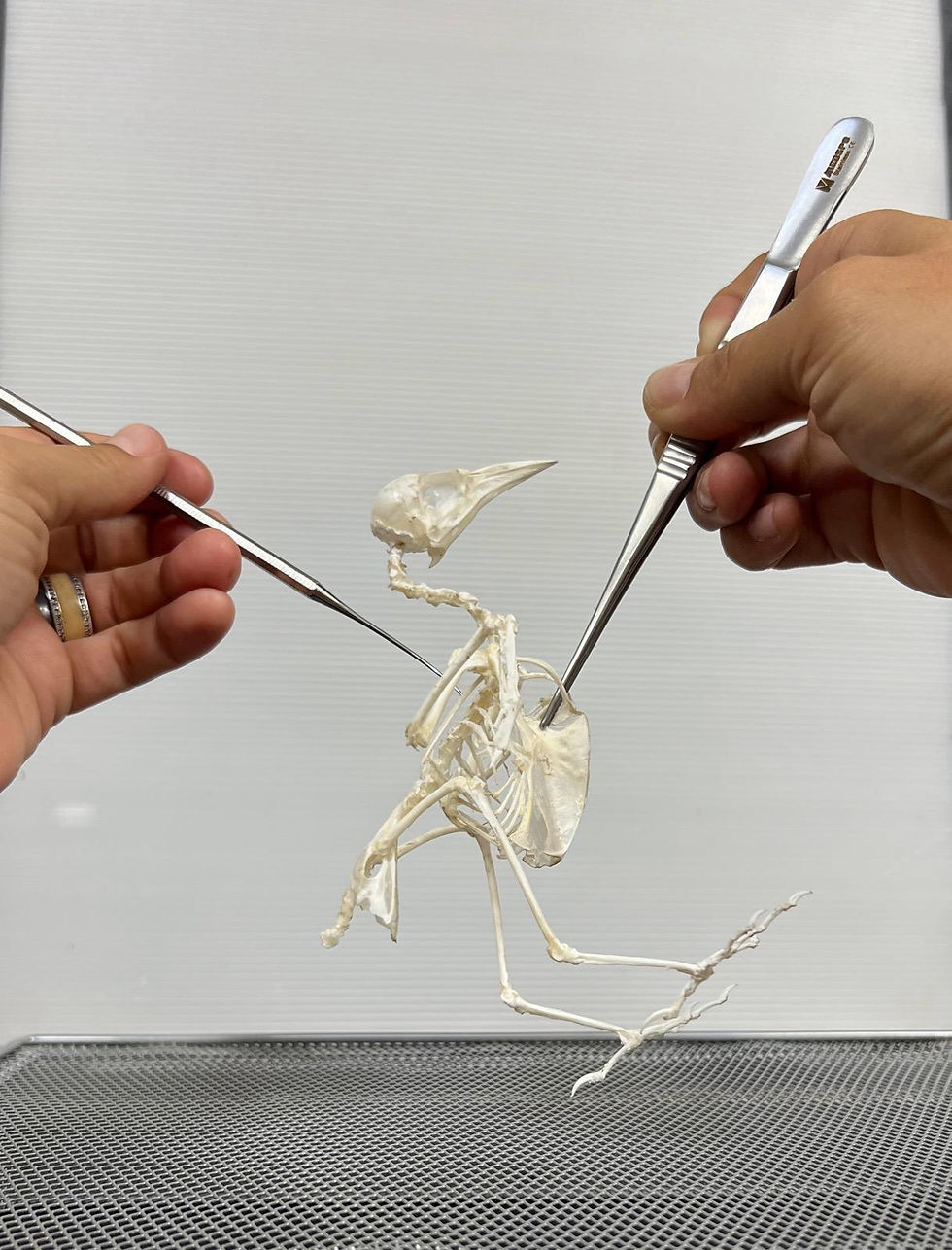Bird Skeleton Oxidation Class
Date and time is TBD
|Institute for The Natural History Arts
With Divya Anantharaman


Time & Location
Date and time is TBD
Institute for The Natural History Arts, 192 Lackawanna Ave, Unit 104, Woodland Park, NJ 07424, USA
About the program

About this Course:
This course is for people who would like to learn the delicate art of cleaning small bird skeletons.
Course Overview:
This course guides students through every step of the oxidation method of skeletal preparation, over 2 sessions. In this process, delicate skeletons are held intact by a fine layer of ligaments, providing many possibilities in creating osteological displays for artistic and educational use. Students will create and keep their pieces. It is suggested to prepare a few reference photos with ideas for poses.
Divya Anantharaman is an artist, taxidermist, and educator who specializes in small animals. In this class, students will develop familiarity in working with very small animals, from skinning, defleshing, to carefully cleaning and monitoring chemical baths. Our subject will be the English sparrow, a tiny but mighty bird familiar to most city dwellers.
By the conclusion of this course, students will have prepared their very own European Starling skeleton in the pose of their choice, have a clear understanding of the oxidation method of skeletal preparation, and a new appreciation for anatomy at a small scale.
This class is suitable for both beginners as well as those with an artistic or scientific background looking to learn new skills. All levels of experience are welcome, with the understanding that practice and patience will make the ongoing study of preservation arts even more fulfilling.
Course Outline:
This course takes place over 2 sessions.
Session 1:
At the beginning of class, the instructor will demonstrate the skinning and defleshing process. Students will then proceed to deflesh their own raw specimens, under close supervision from the instructor. These specimens will then go into the first of a series of chemical baths in the skeletal cleaning process. We will examine specimens that have been soaked for varying amounts of time in various chemical baths, and develop an understanding of how the tissue changes.
Session 2:
In this session, students will be working with specimens that have been prepared for tissue removal, seeing the effects of the chemical reactions. After this final round of tissue removal, students will position their skeletons to dry on a temporary base. Students have the option of drying their pieces in the studio and picking up at a later date, or bringing a box to carefully transport their skeletons home. The skeletons take 24-48 hours to fully dry (depending on environmental conditions) Students will keep their skeletons, and go home with the knowledge to make and maintain their own skeletons in the future.
Morning refreshements will be available both days.
What INHA Will Provide:
Specimens (students take home finished pieces)
Tools, chemicals, containers, and PPE to prepare specimens (students will have access to these over the course at the INHA studio)
All materials are to be used in class.
Supply list (to be supplied by student):
A small box to take home the skeletons.
Desired display case.
About the Instructor:
A unique combination of science and style, Divya Anantharaman is New York City's premiere taxidermist. Their award winning work centers honor and compassion for animals, and seeks to combine the demonstrative aspect of scientific presentation with the symbolic, introspective nature of art. Their clients span museums, designers, gallerists, and collectors, though Divya most enjoys demystifying this scientific art in their beginner friendly classes. They've starred in the Emmy winning documentary, Rearranging Skin, which portrays taxidermy as a practice rooted in care. In her commitment to conservation, they also volunteer with NYC Bird Alliance, NYC Plover Project, and other efforts to engage diverse audiences with nature.
Group Size: 10 people
Class Policies:
Please arrive 15m prior the class commencement. If you are running late, please call us at (973) 890-1516 or (973) 609-2153 and let us know.
By signing up for our classes, you recognize the risks associated with these classes - working with sharp tools and practicing safe specimen handling.
You agree to follow the instructor’s advice and will not hold the instructor or venue liable for harm.
For your safety and to accommodate studio policy, no food is allowed during classes. Drinks in a container with a lid are permitted.
Microwave, refrigerator and coffee machine are available if you want to bring your own lunch and stay in the studio during lunch time. If you prefer to leave, there are many nearby restaurants and fast-food chains.
Due to Covid 19 policies, social distance and the use of masks will be based on community guidelines.
You will receive an email with a release form and a waiver. Documents must be signed and returned to INHA prior the class.
No refunds unless the instructor reschedules or cancels the class. Please contact us if you cannot attend.